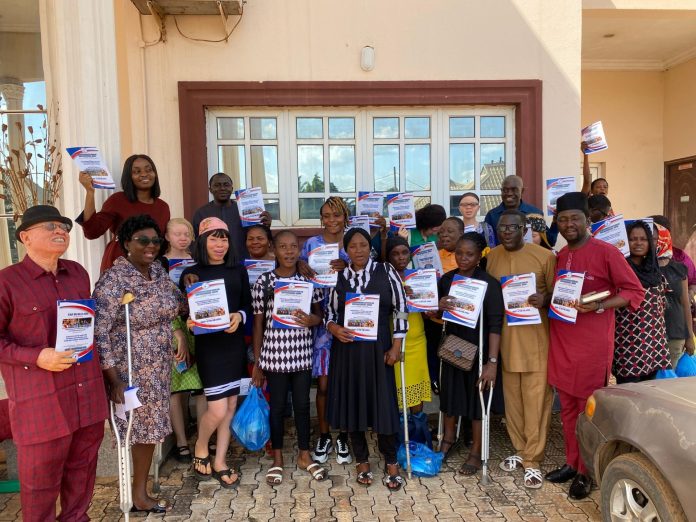Makurdi, Benue State – In an inspiring step towards inclusivity and empowerment, Sauri Growth Initiative for Women and Youth with Disabilities recently hosted a transformative one-day dialogue on climate change. Held in Makurdi, the event brought together 30 participants, including women and girls with disabilities and key climate change stakeholders, to address the pressing impacts of climate change disasters on this vulnerable community and to chart pathways for inclusive policies and interventions.
The gathering was an opportunity for open dialogue, advocacy, and collaboration, as participants joined forces to spotlight the unique challenges women and girls with disabilities face in the context of climate change. The event was designed not only to elevate their voices but also to make these voices central in shaping policy discussions around climate resilience in Benue State and beyond.
Key Highlights of the Dialogue:
1. Round Table Discussions: Amplifying Voices and Experiences
One of the most impactful parts of the dialogue was the roundtable discussion, where women and girls with disabilities courageously shared their personal experiences and struggles in facing climate-related challenges. The discussion painted a vivid picture of how climate change disproportionately affects people with disabilities, who often have fewer resources and support systems during extreme weather events, droughts, and floods.
The open forum allowed participants to candidly describe obstacles they encounter, including limited access to emergency shelters, inadequate communication about climate risks, and the physical and logistical challenges they face when relocating due to disasters. Stakeholders listened intently, absorbing the insights and reflecting on ways they could incorporate these perspectives into future climate policies and planning.
2. Engaging Panel Discussions: Creating Pathways to Inclusive Solutions
The dialogue included two powerful panel discussions, which brought together government representatives, climate change experts, and community leaders alongside women and girls with disabilities. These diverse perspectives helped generate a dynamic exchange of ideas on how to make climate change policies more inclusive and responsive to the needs of all community members.
Panelists explored innovative strategies for resilience, such as adapting infrastructure to accommodate people with disabilities in emergency scenarios, establishing accessible communication channels for climate alerts, and ensuring that disaster response teams are trained to support individuals with disabilities. By addressing these issues, the panels highlighted the need for proactive and adaptable policies that can protect the most vulnerable during climate-related events.
3. Policy Brief: A Roadmap for Change
The event culminated in the presentation of a comprehensive policy brief, which outlined the key takeaways from the dialogue and offered specific recommendations for inclusive climate action. The policy brief emphasized that without considering the unique needs of people with disabilities, climate policies may inadvertently deepen inequalities and fail to protect those who are already marginalized.
Among the recommendations was the need for an inclusive approach to climate planning that ensures all voices are heard, especially those of women and youth with disabilities who are frequently excluded from decision-making processes. The brief called for government agencies and climate stakeholders to implement policies that actively include disability perspectives, to invest in disability-friendly infrastructure, and to design emergency response plans that are accessible to everyone, regardless of ability.
A Transformative Step Towards Empowerment and Resilience
This inclusive climate change dialogue has set a powerful precedent in Benue State, marking a transformative step towards empowering women and youth with disabilities to become agents of change in the face of climate adversity. The event emphasized that, with the right policies and practices, communities can build resilience by embracing the strengths and unique perspectives of every individual.
Speaking after the event, one participant expressed optimism, saying, “For the first time, I feel that my concerns are being heard. I believe that with initiatives like this, we can create a future where people with disabilities are not left behind in times of crisis.”
The Sauri Growth Initiative’s efforts to organize this dialogue underscore the importance of inclusion in climate change adaptation and resilience-building. The event has set in motion a movement where, through collaboration, education, and policy reform, a safer and more inclusive future for women and youth with disabilities can become a reality in Benue State and beyond.
As climate challenges continue to intensify globally, gatherings like these serve as a reminder that inclusive dialogue is not just a matter of social responsibility but also a pathway to stronger, more resilient communities for all.


